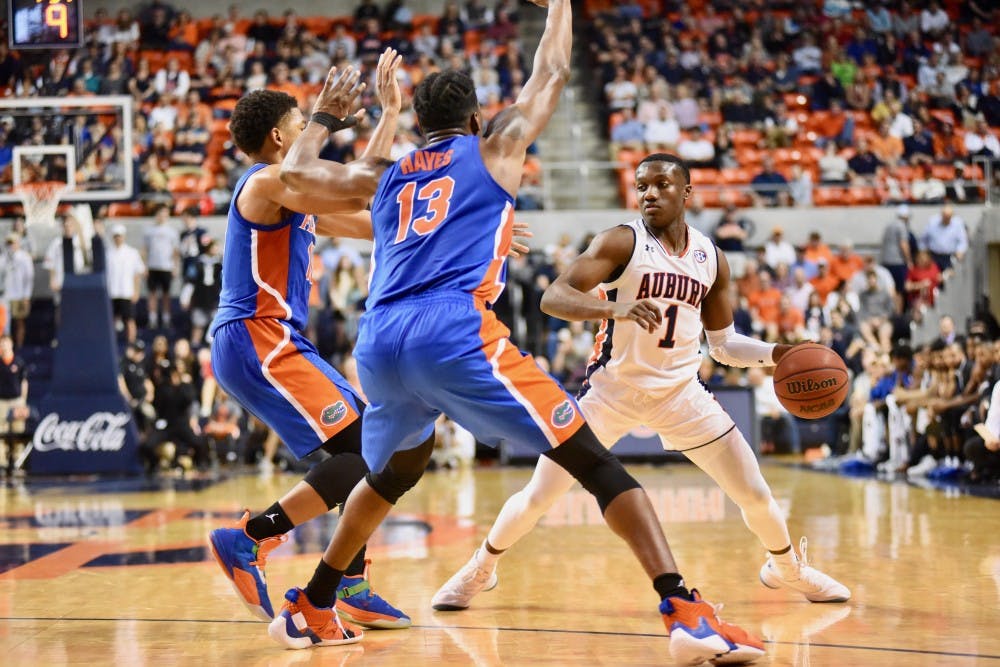The temperature on The Plains wasn’t the only thing that felt like spring.
On their way to a 76-62 victory, the Auburn Tigers had to face every defensive scheme imaginable from the Florida Gators in a game that gives a glimpse of what this team will look like come March.
It’s no secret Auburn wants to play fast. The Tigers’ philosophy is to force their opponents to play at a high tempo and force uncharacteristic turnovers that lead to transition threes.
This is not lost on Mike White, who coaches the slowest team not only in the SEC, based on possessions, but the 302nd slowest team in the nation out of a possible 353 teams. White’s four out offensive sets usually only leave a couple seconds left on the shot clock every time down. Safe to say the Gators play with no sense of urgency.
It was clear from the opening tip that White preached to his team that on defense they had to bring Auburn down to their level. The Gators cycled through a variation of full-court presses, zone defenses and ball screen traps to stifle the Tiger’s offense. Ultimately, they succeeded.
“They threw the kitchen sink at us,” said Coach Bruce Pearl. “It does muck it up. We talked to the point guards before the game, ‘Look, you’ve got to have your calls in your bag because I can’t always get you those calls in a shorter clock.’ I thought we did OK with that.”
Auburn had just 66 possessions in the contest which is two lower than Florida’s average. The Tigers weren’t able to get as many shots off and were relegated into being a halfcourt scoring team, yet none of it mattered.
What’s gets lost in the headlines and the excited announcer’s comments is that Auburn statistically isn’t a fast-paced team. It is true that they prefer to run their opposition off the court due to their lack of size, but once they get set up on offense, they’re as slow as they come.
Oddly enough, Auburn isn’t that dissimilar to Florida. Both teams rely on switches to free up their high scoring guard tandems and are willing to wait till the last possible tick on the shot clock to find an open three. What separates them is the “early offense.”
Early offense is exactly what it sounds like. When Auburn gets the ball the plan is to run. This forces the defense to react quickly, resulting in them being on their heels for the rest of the possession. Coach Pearl instilled this into his team as far back as training camp because most of the team's points come off plays like these. This is what Mike White wanted to minimize.
The second a team lets up a couple of shots from early offense in Auburn Arena, there’s a good chance the Tigers go on a double-digit run without the opposing players knowing what hit them. To prevent this, White had his team start out defensive possessions in either a 1-3-1 zone press or a box and one. What these zones do is prevent immediate penetration from a player dribbling downhill, while also protecting the wings from a quick three.
It forces the Tigers to set up their offense. If the Tigers tried to use a down screen to free up their guards bringing up the ball, Florida would trap the ball handler and leave a non-ball dominant player in charge of restarting the offense.
Once the Tigers made the transition to halfcourt, the Gators would switch to man-to-man defense mid possession in order to account for all of the shooters on the floor.
This defensive strategy along with a rolled ankle, played a role in Jared Harper having one of his quietest nights of the year. Harper tied his lowest amount of assists on the season with three and scored under 10 points for the second time in SEC play.
Despite having to play in an unfamiliar situation, Pearl made adjustments for his team to succeed. The Tigers maximized the few possessions they did get by scoring an average of 1.15 points every time they touched the ball. In comparison, the Gators only scored .954 points per possession.
In addition to finding good looks, the reason why Auburn was able to utilize its time with the ball was their lack of turnovers — an emphasis it's had all year.
“Mike [White] said after the game that we were really hard to guard,” Pearl said. “I sure appreciate the compliment from him. I think so much of him and his program.”
The Tigers passing this test is a welcome sign for fans that want to see them do well in March. Teams that have success in the tournament tend to play slower and try to dirty up games with zones. Both Villanova and Michigan, last year’s championship matchup, play at a pace that’s in the bottom 50 of teams nationally. If Auburn can figure out the trouble the team has shooting on the road, it can prepare for almost any team in the country. Pearl demonstrated his level of preparation when Chuma Okeke stole the ball off a popular Florida inbound play to kill any chance at a late-game comeback.
From here on out the Tigers need to have what’s ahead of them come springtime on their mind.
Do you like this story? The Plainsman doesn't accept money from tuition or student fees, and we don't charge a subscription fee. But you can donate to support The Plainsman.
Bryce Johnson is a junior Journalism major at Auburn University from Santa Monica, CA. He works as a sports writer for The Plainsman.
- @Brycejohnson310
- bzj0020@auburn.edu






